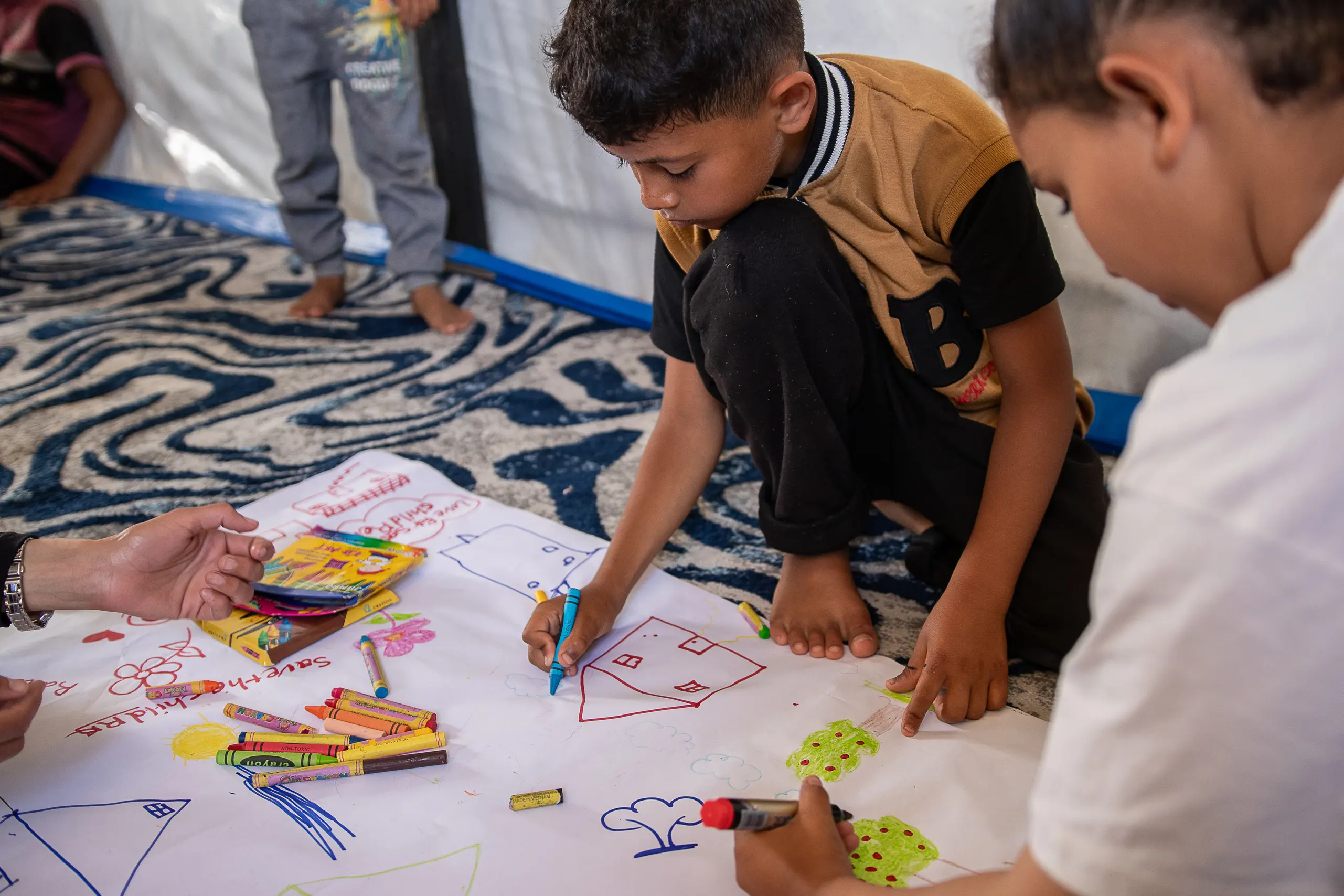근본적이고 지속적인 변화를 위한 사업을 진행합니다.
전세계 수백만 명의 아이들은 분쟁과 긴급 위기 상황 때문에 교육을 받을 기회를 잃고 있습니다. 약 1,500만 명의 난민 아동들이 집을 떠난 후 학습이 중단되었습니다.
재난과 분쟁으로 고통받는 아동들에게 교육은 안정감과 보호를 제공하고, 정상적인 삶으로 회복하는 데 중요한 역학을 합니다. 위기 상황에서 아이들에게 교육을 제공하는 건 매우 어려운 일이기 때문에, 세이브더칠드런은 분쟁과 재난 위기를 겪은 상황에서도 다양한 교육 방식과 자원을 통해 이를 해결하려고 노력합니다. 또한, 안전한 학습 공간과 교육 자료, 교사 훈련 등을 통해 학습이 지속될 수 있도록 돕고 있습니다.
긴급 상황의 초기 단계에서 교육은 아이들을 보호하고 생명을 구할 수 있습니다. 폭발물로부터 안전을 지키는 법이나 질병 확산을 막는 방법과 같은 중요한 생명을 구하기 위한 지식을 제공하며, 안정감을 주고 인지 능력을 회복할 기회를 제공합니다.
세이브더칠드런의 안전한 공간(Safe space)은 극도의 고통에 시달리는 아이들에게 중요한 심리적 지원을 제공합니다. 표현 예술, 문제 해결 게임, 간단한 호흡법과 같은 학습 활동을 통해 아이들이 정서적으로 회복할 수 있도록 돕습니다. 또한 친구들과 안전한 어른들의 지원 속에서 함께 배우고 노는 단순한 일상이 아이들의 웰빙에 중요한 역할을 합니다. 이후 점차적으로 읽기와 쓰기 같은 학문적 학습을 도입합니다.
위기 상황에 처한 지역의 아이들에게 교육은 매우 중요하며, 학교로 돌아가 학업을 지속하는 것은 아이들에게, 그리고 우리들에게 가장 큰 관심사입니다. 전 세계에서 긴급 상황을 겪고 있는 아이들에게 생명을 구하는 학습이 어떻게 도움이 되는지에 대해 아래 기사 본문을 통해 네 명의 인도주의자들의 경험을 들어보시기 바랍니다.
▷ “Education is a Lifeline in Emergencies” 기사 원문 보기

▲ 가자지구 세이브더칠드런 학습공간에서 활동에 참여하고 있는 아이들
Shadi* (8) and his cousin Aya* (13) attend's Save the Children's learning space in Gaza. Sacha Myers / Save the Children Sacha Myers / Save the Children
As many children across the world head back to school, millions of children are being robbed of their education by conflicts and emergencies.
As many children across the world head back to school over the coming weeks, millions of children are being robbed of their education because they are caught up in conflict and emergencies. Nearly 15 million refugee children have had their learning interrupted after being forced to flee their homes.
In the first phase of an emergency, education can protect children and save lives. It can provide a sense of stability, and a chance to regain essential cognitive skills, as well as essential lifesaving learning like how to stay safe from unexploded bombs or how to prevent the spread of disease.
Our Safe Spaces provide vital psychosocial support to children who may be in extreme distress. Learning activities like expressive art, games to practice problem solving, and simple breathing techniques help children to recover emotionally. The simple routine of learning and playing with friends with support from safe adults is key to children’s wellbeing. We then gradually introduce more academic learning like reading and writing.
We also know that education is important to children from crises-affected countries, with going back to school ranked as their highest concern.
We have asked four humanitarians to share their experiences of how lifesaving learning can help children from across the world who are living through emergencies:
For more details, you can read the full article here.








